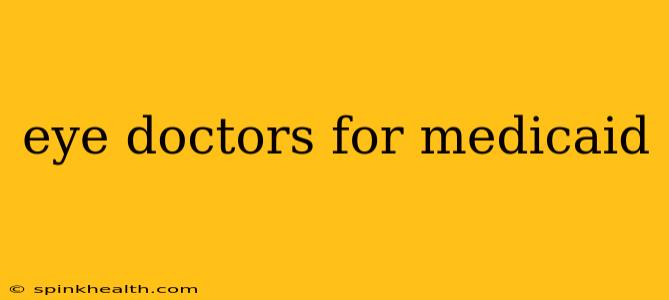Finding affordable eye care can feel like searching for a needle in a haystack, especially if you rely on Medicaid. But don't worry, you're not alone. Millions of Americans utilize Medicaid for their healthcare needs, and accessing quality eye care is absolutely possible. This guide will walk you through the process, answering common questions and offering tips for finding the right eye doctor for your Medicaid plan.
Let's start with a story. Imagine Sarah, a single mother working two jobs to make ends meet. Her vision has been blurring lately, making it difficult to read to her son at night or even drive safely to work. She's on Medicaid and worries about the cost of an eye exam and glasses. Sarah's story is unfortunately all too common, but with the right information, accessing affordable eye care can be within reach.
How Do I Find Eye Doctors That Accept Medicaid?
This is the most crucial question, and thankfully, there are several ways to find eye doctors who accept your specific Medicaid plan.
-
Your Medicaid Website: Most state Medicaid websites have provider directories. This is usually the most reliable source, allowing you to search by specialty (ophthalmologist or optometrist), location, and even accepting insurance plans. This will make it easy to find in-network providers.
-
The CMS Provider Directory: The Centers for Medicare & Medicaid Services (CMS) also maintains a national directory, although the information might be less specific than your state's directory. It's a good secondary resource, especially if your state's directory is difficult to navigate.
-
Contact Your Medicaid Caseworker: If you are having trouble finding information using the online directory, don’t hesitate to contact your caseworker. They are there to assist and can provide personalized guidance on choosing a provider within your plan’s network.
What's the Difference Between an Ophthalmologist and an Optometrist?
This is a frequent point of confusion. Understanding the difference is key to getting the right kind of care.
-
Optometrists are primary eye care providers. They perform comprehensive eye exams, diagnose vision problems, prescribe eyeglasses and contact lenses, and manage common eye diseases. They are your first stop for most eye care needs.
-
Ophthalmologists are medical doctors specializing in eye surgery and the treatment of eye diseases. They're the ones to see if you have a serious condition requiring surgery or specialized treatment, such as glaucoma, cataracts, or diabetic retinopathy. Often, an optometrist will refer you to an ophthalmologist if needed.
Knowing the difference helps you select the appropriate provider for your specific needs. For routine eye exams and prescriptions, an optometrist is usually sufficient.
Does Medicaid Cover Eye Exams and Glasses for Adults?
Medicaid coverage for eye care varies by state and plan. While most Medicaid plans cover some eye care services for adults, the specifics can differ significantly. Some plans may cover routine eye exams, while others may only cover them under specific circumstances, such as detecting a pre-existing condition. Similarly, coverage for eyeglasses or contact lenses also varies; some plans may cover them partially, while others may not cover them at all.
Always check your specific Medicaid plan's benefit guide or contact your caseworker to understand the exact coverage you have. Don’t assume; confirm.
What if My Preferred Eye Doctor Doesn't Take My Medicaid Plan?
This happens. If your preferred doctor isn't in your Medicaid network, you have a few options.
-
Check for Out-of-Network Benefits: Some Medicaid plans offer limited out-of-network coverage. Check your plan details to see if there are provisions for reimbursement of a portion of your out-of-pocket expenses.
-
Explore Other In-Network Doctors: Use the resources mentioned above to find an in-network eye doctor near you. While it may require a little more searching, finding an in-network provider saves you money.
How Can I Make Sure I'm Getting the Best Possible Care?
Accessing quality eye care is paramount. While cost is a major concern, don't compromise on quality.
-
Read Online Reviews: Once you've identified a few potential eye doctors, check online reviews to get a sense of their patients' experiences.
-
Ask Questions: Before your appointment, don’t hesitate to call the office and ask questions about their experience with Medicaid patients and their typical wait times.
-
Advocate for Yourself: If you have any concerns or questions about your treatment, don't hesitate to ask your doctor for clarification.
Remember Sarah's story? With a little research and proactive engagement, she successfully found an eye doctor that accepted her Medicaid plan, got the glasses she needed, and is now able to see clearly, read to her son, and drive safely. Finding affordable eye care on Medicaid is achievable; you just need the right information and a bit of determination.

